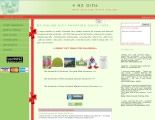March Stats - 10608 Pageviews from 3751 unique visitors. www.tearoha-info.co.nz/HolidayPark Our most visited index pages, in order of popularity were:- INDEX - ACCOMMODATION - INFORMATION - NEWSLETTER 112 - BUSINESSES - REAL ESTATE - ACTIVITIES - CLASSIFIEDS - DINING - NEWSLETTER 123 - NEWSLETTERS - ENQUIRY - NEW LISTINGS - VENUES - NEWS. Site of the Month is Berlusconi on Whitaker and they receive a free direct click through and feature image from www.tearoha-info.co.nz to their website. |
The benefits of creating great website content ... |
In the world of SEO and Internet marketing, content still reigns King. Content now comes in many forms - blogs, videos, articles, white papers, posts on social networking sites etc. etc. It doesn't matter what kind of content your company is producing, ensure that it is more relevant, more engaging and of more superior quality than your competitors. Ongoing discussions on the Google Panda Update show us that producing content that is anything less has the potential to negatively impact your website, aside from providing no real benefit in the first place for you or your readers. Companies should be very careful not just to be focusing on the content they create that gets published offsite; they also need to focus equally, if not more, on the content that is published on their website. Your website's content is what is going to convince visitors to stay and, hopefully, encourage them to act. So give them a reason to do just that. If a visitor comes to your site because they were looking for information, (perhaps an answer to a question) your content better give it to them. One way to make sure this happens is to create a FAQ page. Not only does the Say you own a panel repair shop and someone searches for "getting rid of paint scratches". Your FAQ page can answer their inquiry by talking about common solutions they can try at home, while simultaneously encouraging them to come into your shop if the damage is too great for a simple touch up. Not only have you answered their question, you have also placed your company in their mind as a possible solution to their paint problem. You weren't just trying to sell them on your services – a practice which can turn a lot of visitors off. They don't want to be sold to, they just want the information they are looking for. Your content has to give them that information and convince them that your company has even more to offer. If your industry has its own terminology, why not create a glossary for your visitors? Educating your target audience makes it easier to communicate with them. Some keywords your site may be targeting are probably industry specific, but not well known to the general public. How do you get people using those terms to conduct searches? You educate them. Companies that work in IT, manufacturing, medical or any other industries that rely seriously on “industry jargon” should help educate their website visitors in order to turn them into customers. Plus, those glossary pages can become entry points for your site. For example when someone searches for "definition of T-cell depletion," your glossary can answer their question and direct them through to your site. A common problem many sites have is that they break their content up and spread it across too many pages. Yes, your company might offer a dozen different services and you want to rank well in the search engines for each of them, but does each service need its own page? Say you run a boutique marketing firm. One of your biggest draws is your social media management services. There are a lot of components that make up social media management - consulting, training, profile development, brand management and more. Do you give each one of these facets of social media management their own page of content? Are you going to be able to write enough quality content to justify those additional pages? Sometimes it is better to condense multiple pages of thin content into one or two pages of solid information. You don't want to make it hard for a visitor to find what they are looking for when they arrive on your site. Don't bury the real information in webpage drivel just to get your word count up. Why write an essay's worth of content for one page and make the reader search for what they want. Any content that is below the fold - the point where users have to scroll down - has less of a chance of being read because people don't want to go searching for information. It's a fine line between too little and too much content on a page, and really good website content is developed over time. The bottom line is that you have to create website content that provides as much value as offsite content. Content that gets produced elsewhere helps build your brand, but your website needs to measure up to that promise. Don't let good traffic go to waste with inadequate page content. There is no guarantee that the "original wording" of your page is going to be the best – this is something that should be continuously worked on and improved upon. By continuously monitoring your website statistics you should be able to see what pages are most popular and what are not, where your content is too thin and what pages need to be rewritten. The popular pages are top of your “Total Referrers” and your most unpopular with be at the top of your “Total Exit Pages” – you don’t want to see your index page at the top of your “Total Exit Pages” as could indicate that visitors have come to your site and left before exploring any further. Good website content has to be clean, easy to read and understand, and provide real value to the reader. Just like offsite articles, guest blog post submissions and other forms of content marketing, your webpage content needs to serve a real purpose. If all your offsite advertising/content were to disappear and you were forced to rely on it, would your website content be enough to turn visitors into customers?
Domain Names For Sale We have some excellent domain names available now for sale - view and buy online >>> |





 A subject that we have discussed in many previous newsletters, but one that is too often ignored!
A subject that we have discussed in many previous newsletters, but one that is too often ignored!


